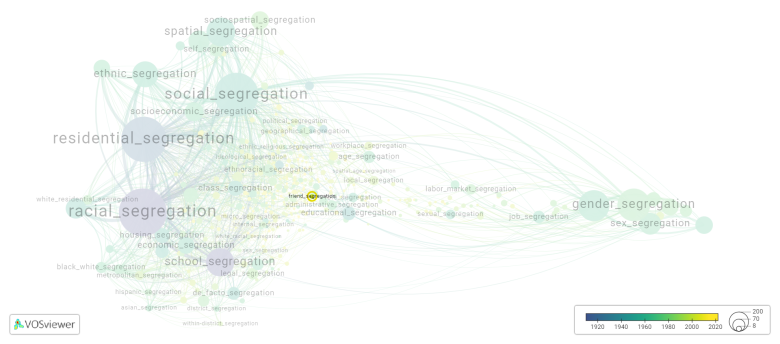Friend segregation: Difference between revisions
(Creating page) |
(Creating page) |
||
| Line 19: | Line 19: | ||
audience segregation | audience segregation | ||
[[File:friend_segregation.png|780x780px]] | [[File:friend_segregation.png|780x780px]] | ||
For the complete network of associated segregation forms, see: | |||
clusters https://tinyurl.com/2d8wg5n3 | |||
year of publication https://tinyurl.com/2235lkhw | For the complete network of associated segregation forms, see: | ||
betweenness centrality https://tinyurl.com/223udk5r | |||
disciplines where segregation forms first appeared https://tinyurl.com/244d8unz | clusters https://tinyurl.com/2d8wg5n3 | ||
year of publication https://tinyurl.com/2235lkhw | |||
betweenness centrality https://tinyurl.com/223udk5r | |||
disciplines where segregation forms first appeared https://tinyurl.com/244d8unz | |||
==References== | ==References== | ||
==Notes== | ==Notes== | ||
Revision as of 07:46, 26 September 2024
Date and country of first publication[1]
2019
Pakistan; Italy; Luxembourg
Definition
Friend segregation refers to the separation or division of friends or social groups based on various factors, such as race, ethnicity, gender, socioeconomic status, or common interests. It occurs when individuals tend to associate and socialize primarily with others who are similar to them, rather than engaging with people who are different from them.
Friend segregation can happen consciously or unconsciously. People may naturally gravitate towards those who are similar to them in terms of background, beliefs, or interests. For example, individuals may form friendships within their own racial or ethnic group, as they may feel more comfortable and similar with their own cultural background.
Friend segregation can have both positive and negative consequences. On one hand, it can foster a sense of belonging, support, and shared experiences within a specific group. It may also create a safe space for individuals to discuss and address common challenges they may face.
On the other hand, friend segregation can lead to the exclusion or marginalization of individuals who do not belong to a certain social group. It can perpetuate stereotypes and prejudice, as people may have limited exposure and understanding of diverse perspectives and experiences. Friend segregation can also hinder social integration and impede efforts to promote diversity and inclusion.
To address friend segregation, it is important to promote diversity, inclusivity, and open-mindedness. Encouraging individuals to engage with people who are different from them can foster understanding, empathy, and appreciation for diversity. Creating opportunities for individuals from different backgrounds to interact and connect can help break down barriers and promote social integration.
See also
Related segregation forms
Friend segregation is frequently discussed in the literature with the following segregation forms:
For the complete network of associated segregation forms, see:
clusters https://tinyurl.com/2d8wg5n3
year of publication https://tinyurl.com/2235lkhw
betweenness centrality https://tinyurl.com/223udk5r
disciplines where segregation forms first appeared https://tinyurl.com/244d8unz
References
Notes
- ↑ Date and country of first publication as informed by the Scopus database (December 2023).
At its current state, this definition has been generated by a Large Language Model (LLM) so far without review by an independent researcher or a member of the curating team of segregation experts that keep the Segregation Wiki online. While we strive for accuracy, we cannot guarantee its reliability, completeness and timeliness. Please use this content with caution and verify information as needed. Also, feel free to improve on the definition as you see fit, including the use of references and other informational resources. We value your input in enhancing the quality and accuracy of the definitions of segregation forms collectively offered in the Segregation Wiki ©.
Friend segregation appears in the following literature
Ahmed J., Villata S., Governatori G. (2019). Information and friend segregation for online social networks: a user study. AI and Society, 34(4), 753-766. Springer London.https://doi.org/10.1007/s00146-017-0789-1

